Overview
The article outlines ten significant side effects of metformin that every woman should recognize. These include:
- Gastrointestinal disturbances
- Vitamin B12 deficiency
- Lactic acidosis
- Unexpected weight loss
- Mood changes
- Skin reactions
- Altered taste
- Kidney function risks
- Medication interactions
Each side effect is explored in detail, providing recommendations for management and monitoring. This emphasizes the importance of proactive healthcare strategies to mitigate risks and enhance overall well-being for women using this medication.
Introduction
Metformin, a commonly prescribed medication for managing diabetes, is associated with a variety of side effects that can significantly impact women’s health and well-being. Understanding these effects is essential for anyone considering or currently using this medication, as they can influence not only physical health but also emotional and lifestyle factors.
What key side effects should every woman be aware of, and how can they effectively manage them to maintain a balanced and healthy life? This article explores the ten most important metformin side effects, providing insights and strategies to navigate the challenges they present.
Tyde Wellness: Personalized Weight Loss Programs for Managing Metformin Side Effects
Tyde Wellness provides customized weight loss programs that seamlessly integrate GLP-1 therapy with personalized nutrition plans, specifically tailored for women. These programs not only emphasize weight loss but also address common metformin side effects, such as gastrointestinal disturbances and vitamin deficiencies. Through ongoing support and guidance, Tyde Wellness empowers individuals to effectively manage their wellness journeys, enabling significant weight loss—often exceeding 20-25% within a year—while also addressing the metformin side effects associated with certain diabetes medications. Notably, over 15 million Americans utilize GLP-1 medications, highlighting their increasing acceptance.
Success stories from participants, like Peter Bernard, who lost 30 pounds in three months using Zepbound, exemplify the program’s effectiveness, demonstrating how GLP-1 therapy can alleviate discomfort and enhance overall well-being. This comprehensive approach ensures that women can reclaim their health and confidence, navigating their unique challenges with expert support.
Gastrointestinal Disturbances: Understanding Metformin’s Impact on Digestion
Gastrointestinal issues, including nausea, diarrhea, and bloating, frequently occur among users of this medication. These symptoms can significantly affect daily life and adherence to the prescribed regimen.
To mitigate these effects, it is recommended to:
- Take 1000mg of the medication twice daily with meals, gradually increasing the dosage.
- Incorporate a diet rich in fiber.
- Ensure proper hydration.
- Consult with a nutrition expert for personalized dietary strategies to alleviate digestive discomfort.
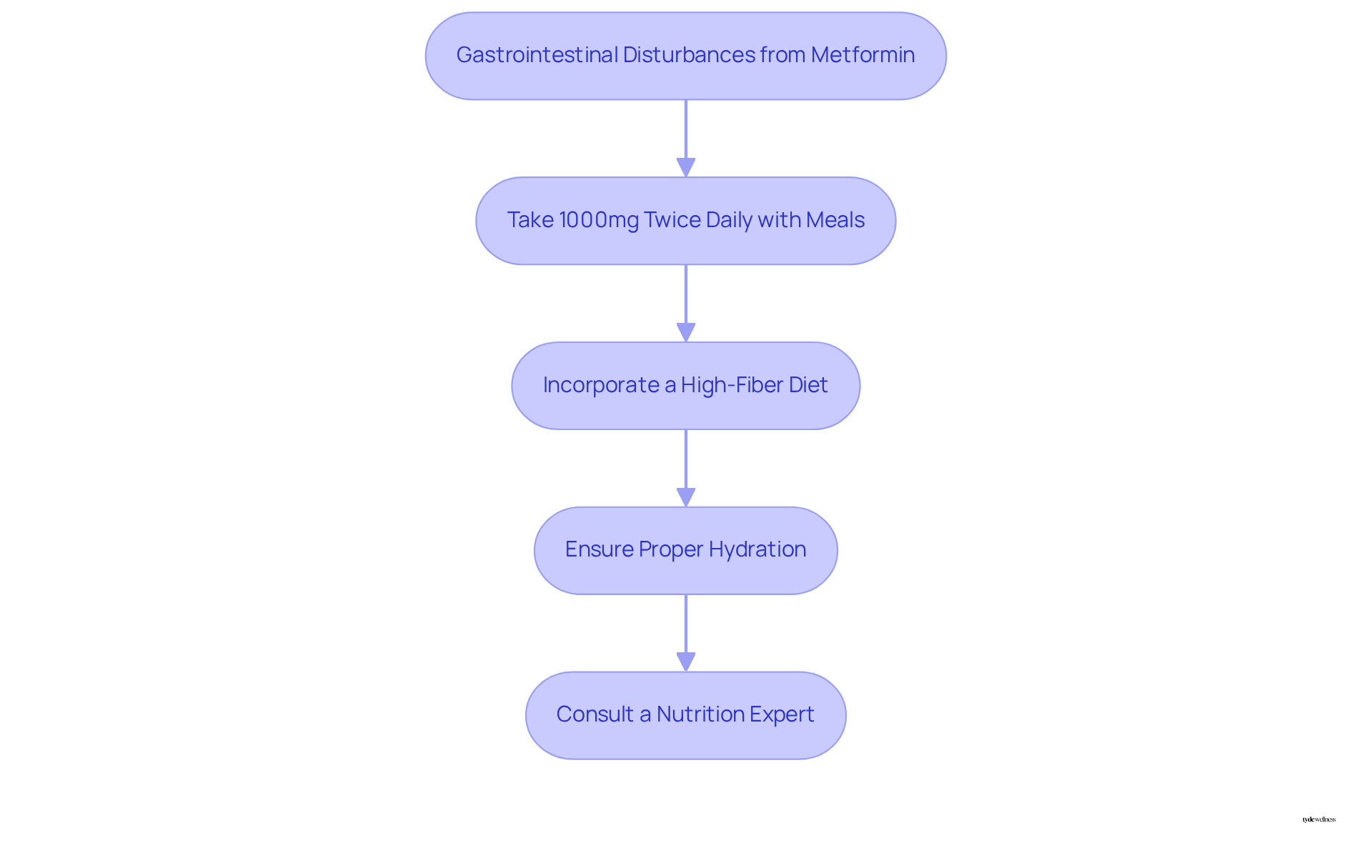
Vitamin B12 Deficiency: A Hidden Risk of Long-Term Metformin Use
Prolonged consumption of this medication has been associated with vitamin B12 deficiency. This deficiency may lead to symptoms such as fatigue, weakness, and neurological issues. Therefore, women using this medication should have their B12 levels monitored regularly. Furthermore, incorporating B12-rich foods into their diet—such as:
- Dairy products
- Eggs
- Fortified cereals
or considering supplementation can help maintain adequate levels. This proactive approach is essential in preventing complications related to deficiency.
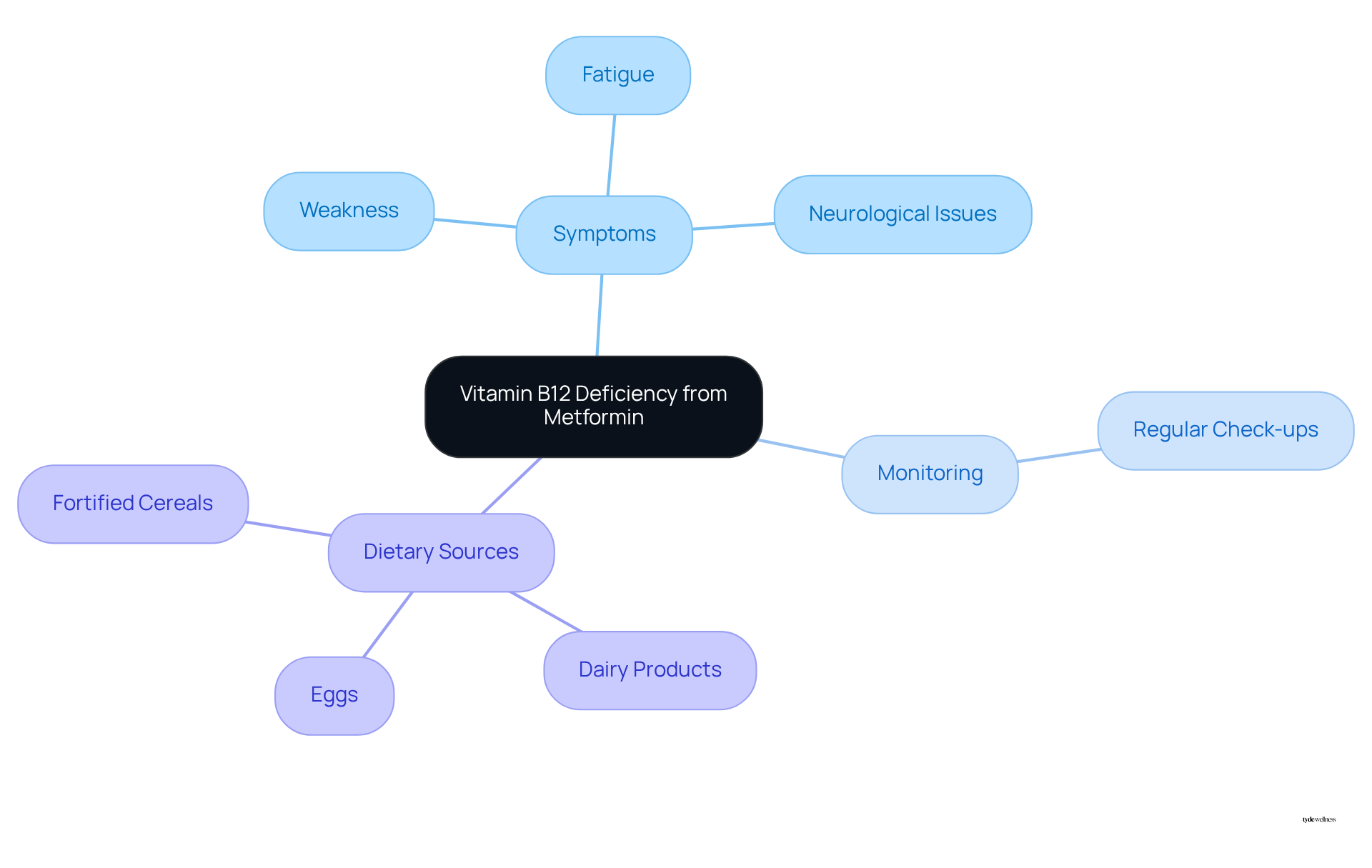
Lactic Acidosis: A Rare but Serious Side Effect of Metformin
Lactic acidosis, although uncommon, represents a serious side effect associated with the medication, which is one of the notable metformin side effects characterized by an accumulation of lactic acid in the bloodstream. Symptoms may include:
- Muscle pain
- Difficulty breathing
- Unusual fatigue
Women, especially those with prior renal issues or those taking higher doses of the medication, are at an increased risk of developing this condition. Individuals with an estimated glomerular filtration rate (eGFR) above 45 mL/min are eligible to initiate treatment with the medication, underscoring the importance of regular renal function monitoring.
Furthermore, healthcare professionals recommend that patients on this medication undergo routine assessments of their kidney function to ensure safe usage and address any potential issues promptly. It is also vital to monitor vitamin B12 levels, as extended use of this medication can lead to deficiency. Additionally, limiting alcohol intake is crucial, as excessive consumption can elevate the risk of lactic acidosis.
Awareness of the symptoms of lactic acidosis is essential; immediate medical attention should be sought if they occur. By maintaining vigilant monitoring and understanding the metformin side effects, individuals can more effectively manage their health while using the medication.
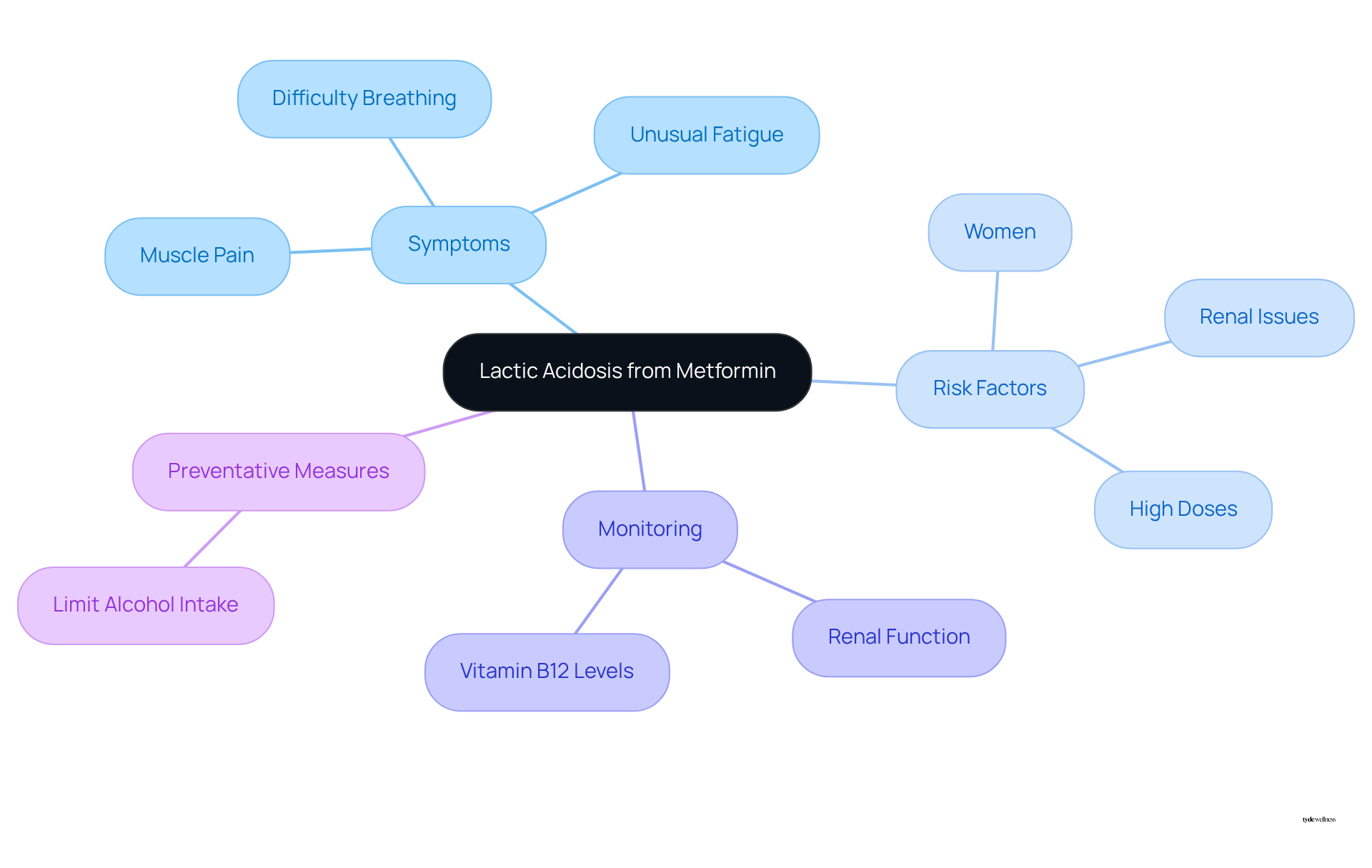
Unexpected Weight Loss: A Surprising Benefit of Metformin
This medication is primarily recommended for regulating blood sugar levels; however, many users report unexpected weight loss. This effect can be particularly beneficial for individuals aiming to lose weight, especially those with insulin resistance. The weight loss may stem from reduced appetite and alterations in gut microbiota. Furthermore, it is crucial to adopt a holistic approach to weight loss, incorporating:
- A balanced diet
- Regular physical activity
- Medication therapy
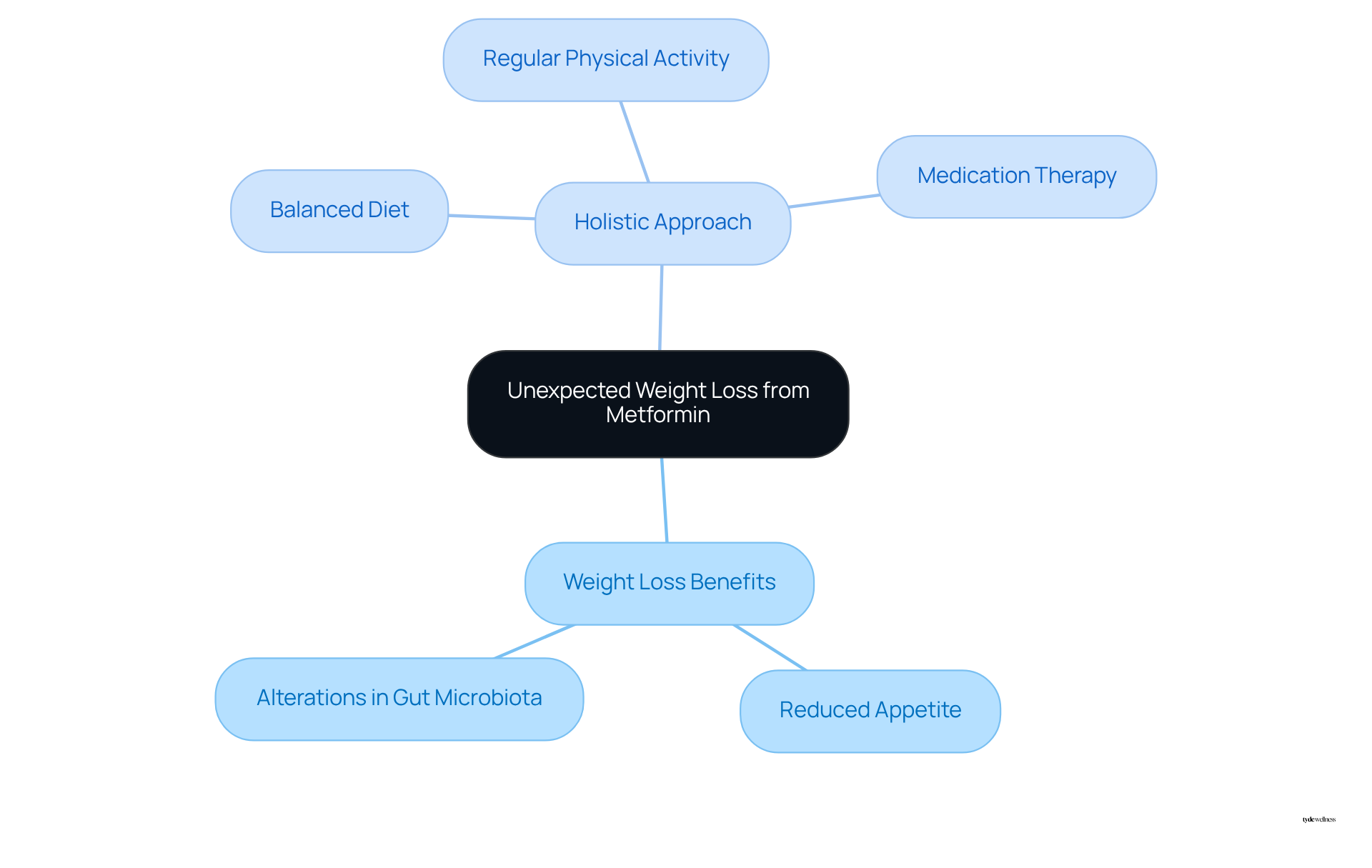
Mood Changes: How Metformin May Affect Your Emotional Well-Being
Certain females using the medication may encounter mood alterations, such as sensations of anxiety or depression. These emotional fluctuations can be influenced by the medication’s impact on blood sugar levels and hormonal balance. It is important for women to communicate any mood changes to their healthcare provider. The provider may recommend:
- Counseling
- Adjustments to their treatment plan
Furthermore, engaging in stress-reducing activities such as:
- Yoga
- Meditation
can also be beneficial.
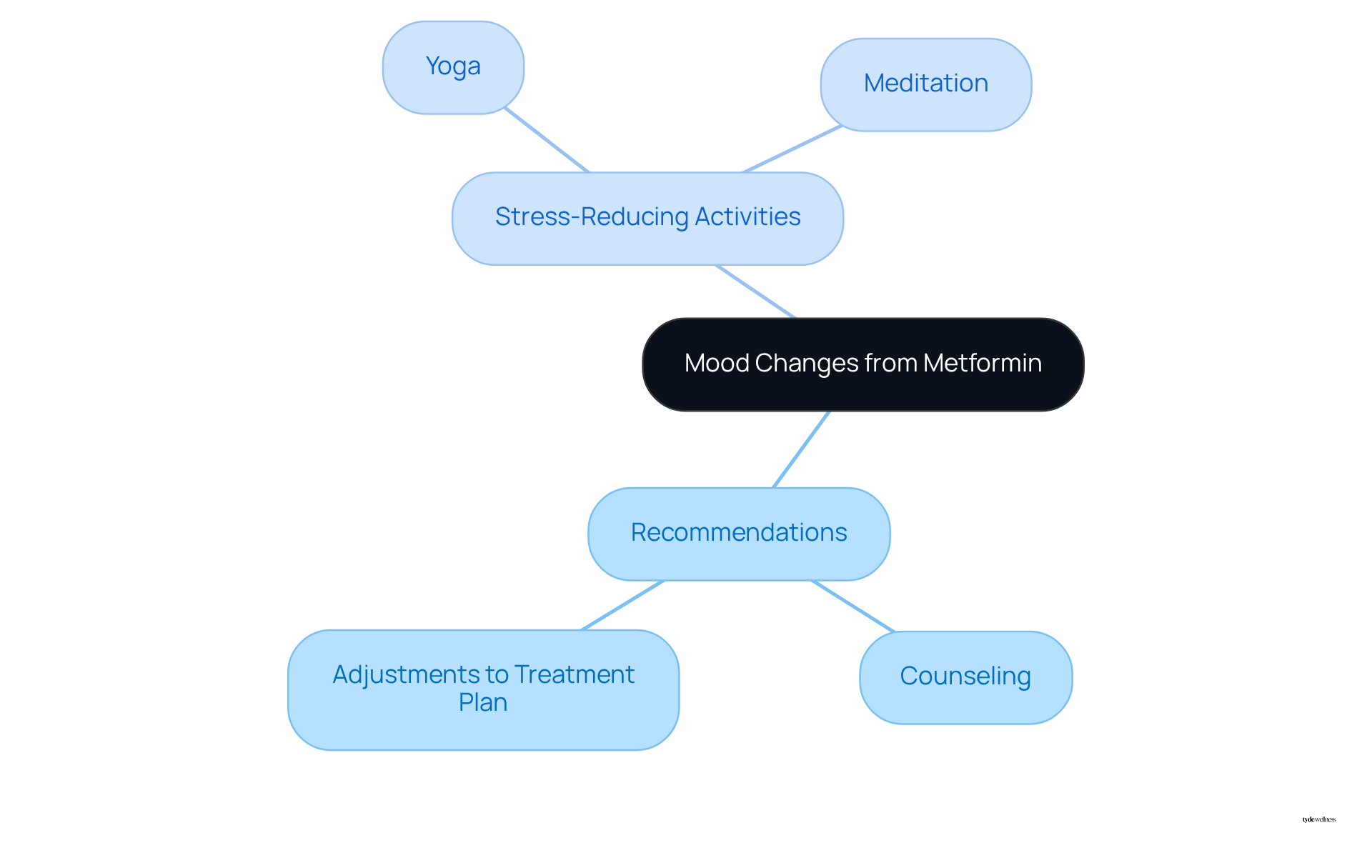
Skin Reactions: Recognizing Allergic Responses to Metformin
Skin reactions, including rashes and itching, can occur in some individuals using this medication. These allergic responses may vary in severity, ranging from mild to severe. Women who notice any changes in their skin should consult their healthcare provider. This consultation can help determine if a specific medication is responsible and discuss alternative treatments if necessary. Furthermore, maintaining good skin care and monitoring for any new symptoms can aid in managing these reactions effectively.
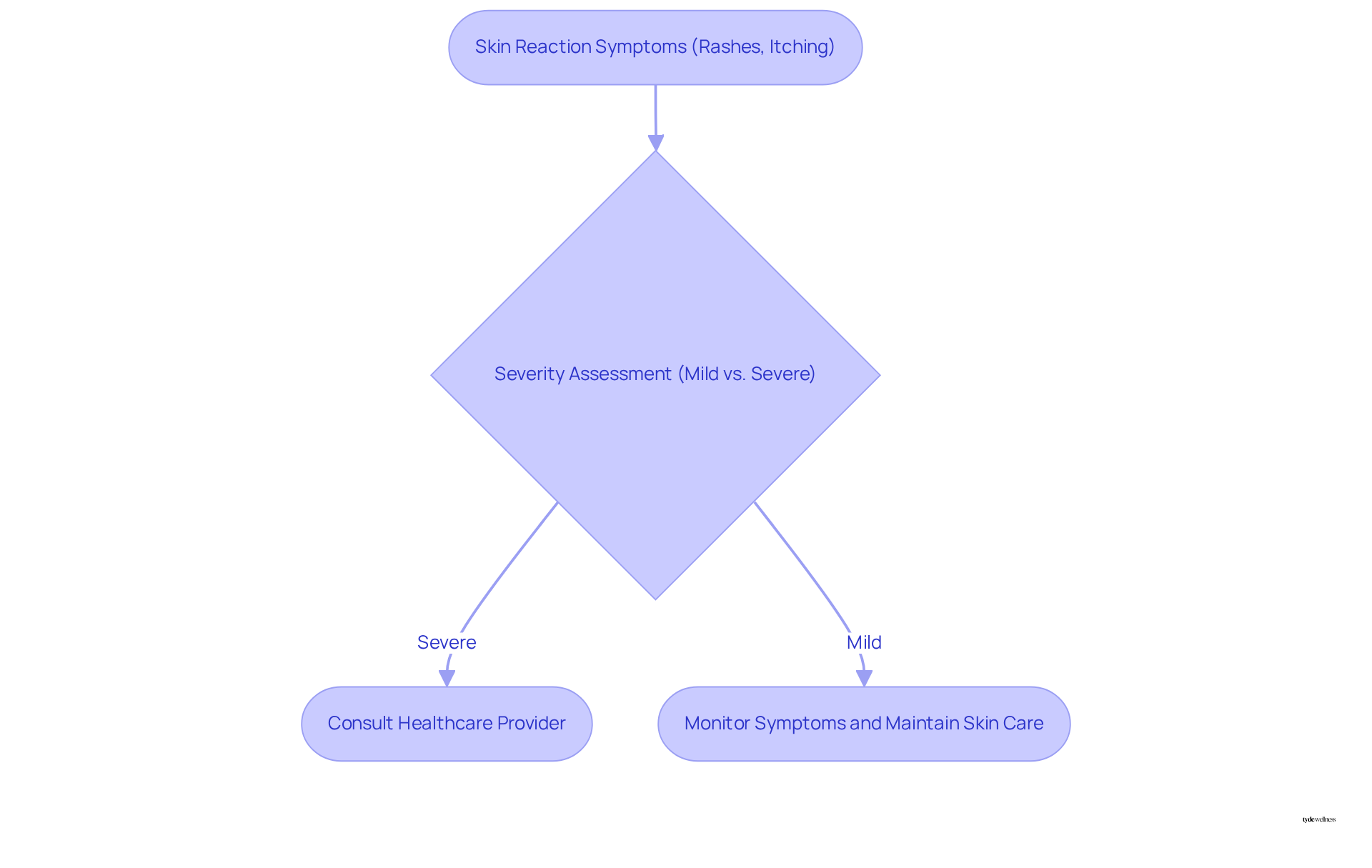
Altered Taste: A Surprising Sensory Side Effect of Metformin
Many users of the medication report experiencing metformin side effects, including a metallic or altered taste, which can influence their appetite and food selections. This side effect of metformin may diminish over time as the body adjusts to the medication.
To cope with this, individuals can try:
- Consuming foods with strong flavors
- Using herbs and spices to enhance their meals
Furthermore, staying hydrated and maintaining a balanced diet is essential to ensure adequate nutrition despite these changes.
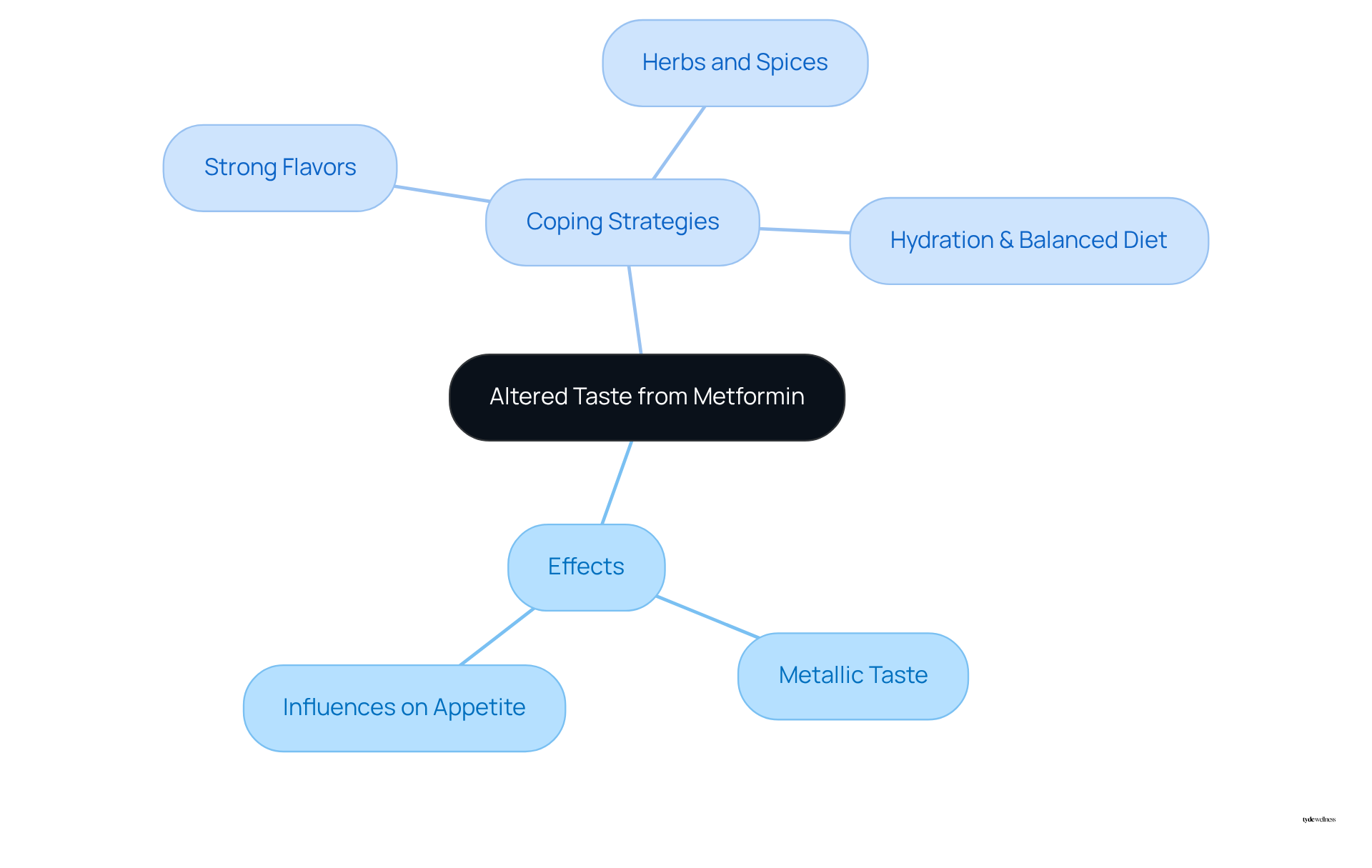
Kidney Function: Monitoring Risks Associated with Metformin Use
The medication is primarily eliminated through the renal system, making the consistent assessment of renal function essential for users, particularly women. Individuals with a history of renal issues or those receiving elevated doses of the medication should undergo regular renal evaluations to ensure safety. The occurrence of lactic acidosis among users of the medication is approximately 9 per 100,000 person-years, underscoring the importance of vigilant monitoring of renal function.
The highest total daily dosage of the medication varies based on estimated glomerular filtration rate (eGFR) levels, with a maximum of 1000 mg for eGFR 30-<45 mL/min per 1.73 m² and 2000 mg for eGFR 45-<60 mL/min per 1.73 m². Hydration plays a crucial role in maintaining renal function; therefore, ensuring adequate fluid intake is vital. Adhering to healthcare provider recommendations can further mitigate risks associated with renal health while using the medication.
Specialists emphasize that while this medication is effective for managing blood sugar levels, its use in women with impaired renal function requires thorough evaluation. Dr. Inzucchi notes, “The diligent observation of renal function is crucial for females on this medication, particularly those with pre-existing renal concerns.” Practical examples show that many individuals successfully manage their renal health while using this medication by following recommended protocols and participating in routine medical check-ups. This proactive approach not only helps minimize potential risks but also supports overall well-being.
To further protect kidney health, women are encouraged to stay hydrated, maintain regular follow-ups with their healthcare providers, and remain aware of any changes in their health status.
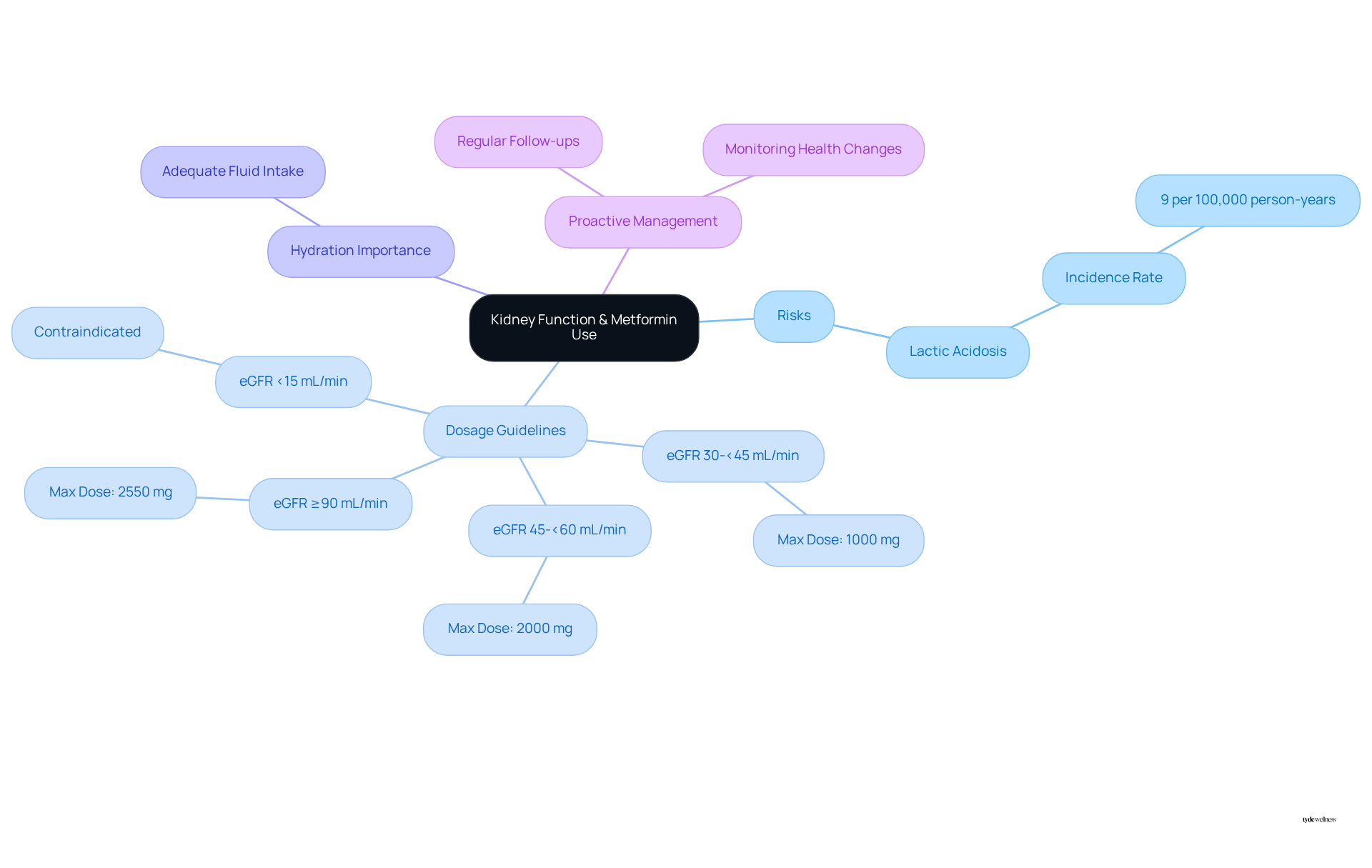
Medication Interactions: What to Avoid While Taking Metformin
Certain medications may interact with this drug, increasing the risk of side effects such as lactic acidosis. Dr. Jyothi Shenoy advises that women should avoid combining this medication with alcohol, as this combination heightens the risk of this serious condition. Additionally, specific diuretics and other diabetes medications may result in adverse effects if not managed appropriately, potentially elevating the risk of hypoglycemia.
It is essential to inform all healthcare practitioners about the use of this medication to ensure safe and effective treatment strategies. Consistent monitoring and open communication with healthcare professionals can help mitigate risks and enhance the overall effectiveness of diabetes medication.
For women using Metformin, it is recommended to keep a record of all medications and supplements being taken and to consult with healthcare providers before making any changes to their medication regimen. This proactive approach can significantly improve health outcomes and ensure safe medication management.
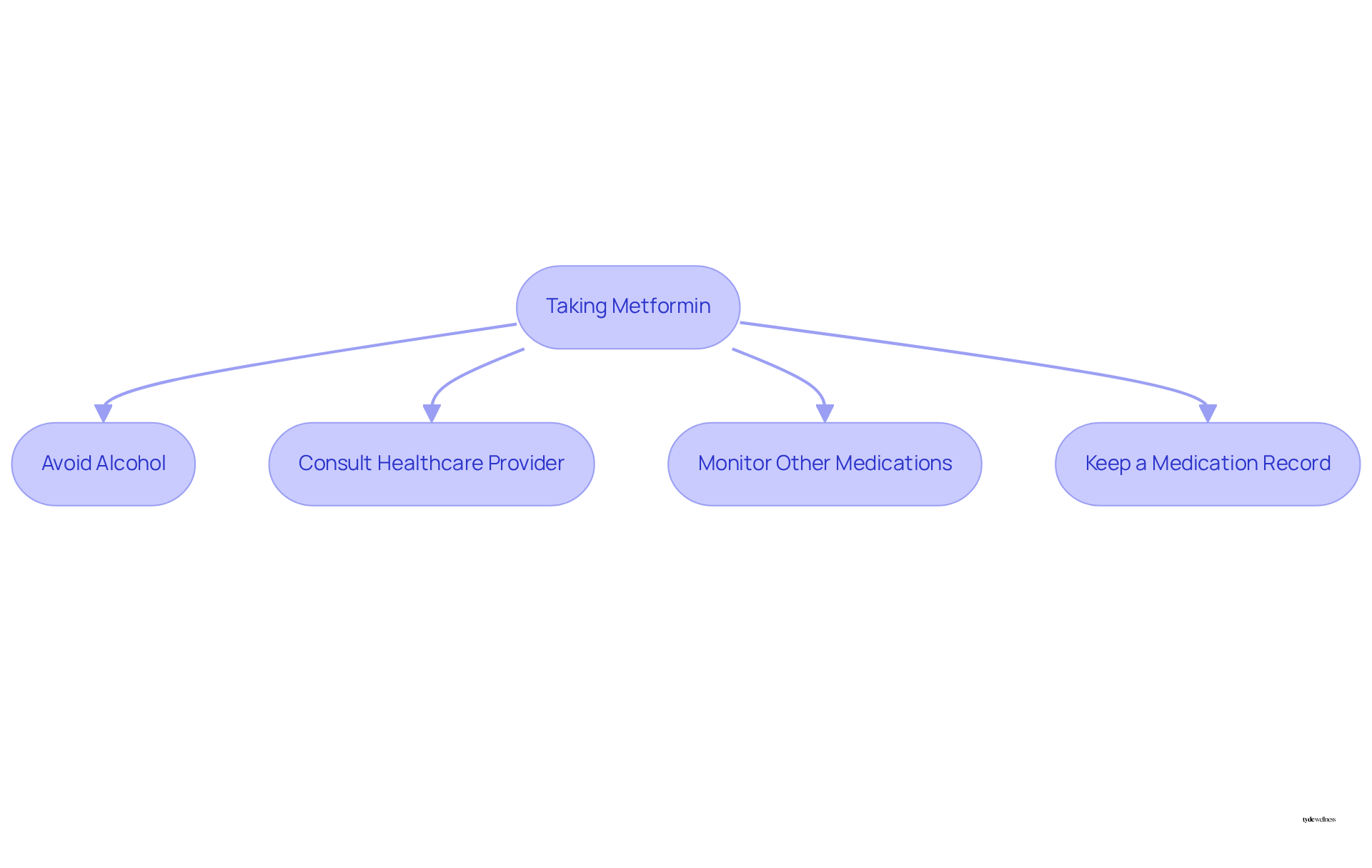
Conclusion
Understanding the various side effects of metformin is crucial for women managing their diabetes effectively. This medication, while beneficial for blood sugar control, can present challenges, including:
- Gastrointestinal disturbances
- Vitamin B12 deficiency
- Mood changes
By being informed about these potential side effects, individuals can take proactive steps to mitigate their impact on daily life and overall health.
The article highlights essential insights into managing these side effects, such as:
- Adjusting medication intake
- Monitoring vitamin levels
- Maintaining open communication with healthcare providers
Furthermore, personalized weight loss programs, like those offered by Tyde Wellness, provide tailored support to address these challenges, enhancing both physical health and emotional well-being.
In conclusion, awareness and education about metformin side effects empower women to navigate their treatment journey confidently. By adopting a comprehensive approach that includes:
- Dietary adjustments
- Regular health monitoring
- Professional guidance
Individuals can effectively manage their diabetes and improve their quality of life. Taking these steps is vital for ensuring a healthier future while using metformin.
Frequently Asked Questions
What does Tyde Wellness offer for managing weight loss and metformin side effects?
Tyde Wellness provides personalized weight loss programs that integrate GLP-1 therapy with tailored nutrition plans specifically for women, addressing weight loss and common metformin side effects.
What are some common side effects of metformin that Tyde Wellness addresses?
Common side effects of metformin include gastrointestinal disturbances such as nausea, diarrhea, and bloating, as well as vitamin B12 deficiency.
How effective are the weight loss programs offered by Tyde Wellness?
Participants in Tyde Wellness programs often experience significant weight loss, frequently exceeding 20-25% within a year.
Can you provide an example of a success story from Tyde Wellness?
An example is Peter Bernard, who lost 30 pounds in three months using the GLP-1 therapy Zepbound, demonstrating the program’s effectiveness.
What dietary recommendations are suggested to alleviate gastrointestinal issues from metformin?
It is recommended to take 1000mg of metformin twice daily with meals, gradually increase the dosage, incorporate a diet rich in fiber, ensure proper hydration, and consult with a nutrition expert for personalized dietary strategies.
What is the risk associated with long-term metformin use regarding vitamin B12?
Long-term use of metformin can lead to vitamin B12 deficiency, which may cause symptoms such as fatigue, weakness, and neurological issues.
How can individuals prevent vitamin B12 deficiency while on metformin?
Individuals should have their B12 levels monitored regularly and incorporate B12-rich foods into their diet, such as dairy products, eggs, and fortified cereals, or consider supplementation.
List of Sources
- Tyde Wellness: Personalized Weight Loss Programs for Managing Metformin Side Effects
- Serious side-effects for popular weight loss drugs raising concerns (https://kutv.com/news/spotlight-on-america/serious-side-effects-for-popular-weight-loss-drugs-raising-concerns-risk-benefits-health-obesity-glp1-zepbound-wegovy-mounjaro-semiglutide-medication)
- Weight Loss Industry: Key Stats, Insights, and Market Trends (https://3dlook.ai/content-hub/weight-loss-industry-overview)
- Popular weight loss drugs linked to rare but severe stomach problems, study finds (https://nbcnews.com/health/health-news/ozempic-wegovy-linked-severe-medical-conditions-stomach-problems-study-rcna118823)
- Gastrointestinal Disturbances: Understanding Metformin’s Impact on Digestion
- What are the key prescription writing points for a patient requiring Metformin (Biguanide) 1000mg, taken with meals? (https://droracle.ai/articles/177393/metformin-1000mg-bits-ac-meals-prescription-writing-points)
- Lactic Acidosis: A Rare but Serious Side Effect of Metformin
- Metformin: When Should We Fear Lactic Acidosis? – PMC (https://pmc.ncbi.nlm.nih.gov/articles/PMC9368510)
- Metformin Side Effects: From Blood Sugar Management to Lactic Acidosis (https://herohealth.com/blog/medication-management/metformin-side-effects?srsltid=AfmBOoptb7RM4cWjosgq5rTsusfOqncBf2iSzQJmFd8sMBX2iwtMTljB)
- Skin Reactions: Recognizing Allergic Responses to Metformin
- Adverse Skin Reactions to Metformin: A Case Report and Mini Review (https://emjreviews.com/dermatology/abstract/adverse-skin-reactions-to-metformin-a-case-report-and-mini-review)
- Allergic reaction to Metformin (https://diabetes.co.uk/forum/threads/allergic-reaction-to-metformin.107802)
- Metformin and the Risk of Chronic Urticaria in Patients with Type 2 Diabetes (https://mdpi.com/1660-4601/19/17/11045)
- Metformin Adverse Skin Reactions – Consensus Academic Search Engine (https://consensus.app/questions/metformin-adverse-skin-reactions)
- Kidney Function: Monitoring Risks Associated with Metformin Use
- Metformin in Patients With Type 2 Diabetes and Kidney Disease: A Systematic Review – PMC (https://pmc.ncbi.nlm.nih.gov/articles/PMC4427053)
- Medication Interactions: What to Avoid While Taking Metformin
- 10 Metformin Drug Interactions to Know (https://buzzrx.com/blog/10-metformin-drug-interactions-to-know)



